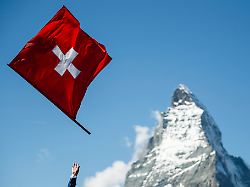Exclusive: Loophole Switzerland
How Russia is circumventing oil sanctions
By Markus Frenzel
03/20/2023, 00:01
There are gaps in the international oil embargo: Russian oil apparently continues to flow towards the world market via Switzerland. n-tv.de has exclusive information that shows how intermediaries are undermining the sanctions under the eyes of the Confederates.
On February 24, 2022, a business collapsed in Switzerland – a very lucrative business that had previously been bubbly: the black gold business from Russia. However, the collapse dragged on. With the attack on Ukraine, it was clear that the Russian military offensive and thus the breach of international law would also have significant economic consequences. The European Union and the US government immediately decided on the first economic sanctions against Russia. The multi-billion euro trade in Russian oil was also targeted.
It just took a while for legal action to take effect. The oil embargo did not come into force until nine months after the start of the war. Since then, billions in oil have not been bubbling up so lavishly in Switzerland – at least not visibly. Because a study by the Zurich non-governmental organization Public Eyewhich is available exclusively to ntv.de, now shows how money is apparently still being made on a large scale with Russian oil in the Alpine republic.
“Switzerland is shirking the implementation of the oil embargo,” says Oliver Classen from Public Eye to ntv.de, “the government trusts the dealers instead.” And apparently with fatal consequences. According to the organization’s research, the sector has now “become much less transparent”. Public Eye experts have spoken to numerous commodity traders, mostly in Geneva, where up to a third of the world’s oil is traded.
Under the eyes of the Swiss authorities
While the big players like Vitol or Glencore largely adhered to the legal consequences, a network of so-called pop-up traders emerged in a few months, which is hardly checked, the research shows.
Public Eye wants to have proven for the company Paramount Energy & Commodities that this company alone has exported at least 72 million barrels (ten million tons) of Russian crude oil from the Siberian port of Kozmino, 100 kilometers southeast of Vladivostok, in the months since the beginning of the war. That’s the equivalent of eight oil tankers a month. According to Public Eye information, the company bought Russian oil even after the embargo came into effect in December 2022.
“When it comes to monitoring the oil embargo, our authorities do the job to rule,” Classen told ntv.de. “We already know that from the time when it came to tracking down the oligarchs’ funds.” n-tv.de has exclusive access to the non-governmental organization’s correspondence with the Swiss Ministry of Economic Affairs. This shows that the Alpine Republic has apparently taken a special path in implementing the sanctions.
Swiss special way
The country does not want to stand alone and has accordingly committed itself to implementing the economic sanctions, including the oil price cap (“price cap”). However, one does not see oneself as a driving part of the coalition. The Swiss government also wants “no over-compliance” – as can be seen from the mail traffic. Too much control is apparently undesirable. Apparently, the Confederates fear too much damage to Switzerland as a business location.
“Companies should be able to continue to offer services for Russian oil,” the Ministry of Economic Affairs confirmed in an email, “but the income for Russia should be reduced by the price cap.” After months of research, Public Eye is certain that Swiss politicians only have a moderate interest in efficiently implementing the sanctions. “The sanction was officially adopted,” Classen continued, “but the implementation was apparently overlooked.”
Transfers to letterbox companies
The lax controls in Switzerland now seem to be well known in Russia too. According to Public Eye research, the Swiss Confederation is now even becoming the focus of the sanctioned companies. A trader from Geneva is said to have reported to the researchers at Public Eye about a particularly piquant case. Accordingly, he was contacted in October 2022 by a subsidiary of the Russian state-owned company Rosneft.
The company offered him 100,000 tons of Russian diesel at a very cheap price. However, the price should be settled via an account in Oman, which runs on a British letterbox company. “Such constructions are apparently common,” says Classen. “There, direct cash flows to Russian companies are avoided by creating a complicated international financial network that is intended to disguise the actual addressee.”
Before the Ukraine war, more than half of all Russian oil exports went to Europe. Germany also covered a third of its needs with imports from Russia. According to Public-Eye estimates, between 50 and 60 percent of international trade went through Switzerland at the time. A billion-dollar business that the Confederates apparently still do not want to do without despite the sanctions. “Our research shows that Switzerland is a loophole for circumventing the oil embargo,” says Classen.
